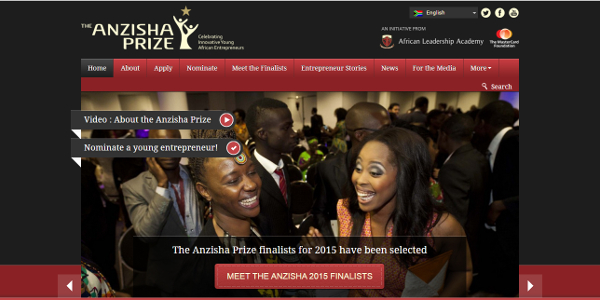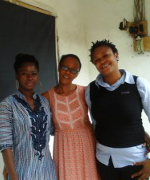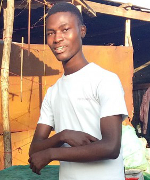Meet Africa’s top young entrepreneurs for 2015
Brought to you by: The Anzisha Prize
This week the Anzisha Prize, Africa’s premier award for entrepreneurs between the ages of 15 and 22, announced its 12 finalists for 2015. They represent nine African countries.
The selection process has been rigorous: of the near 500 applicants, 77 were shortlisted for phone interviews, and 23 were later prioritised for site visits.
But after careful deliberation, the final 12 have been selected and now stand a chance to win a share of US$75,000. The top three winners will be announced towards the end of November, with the grand prize winner taking home $25,000.
Here are this year’s top 12 finalists, and why they deserve to be in the running for the title of Africa’s top young entrepreneur in 2015.
Daniel Mukisa, 21, Uganda – Motorbike delivery service in Kampala
Ugandan Daniel Mukisa is a student at Makerere University who has an eye for market opportunities and passion for youth employment. In January he co-founded Transporter Corporation, a Kampala-based motorbike delivery service.
E-commerce has been growing in Kampala, but poor road infrastructure and traffic congestion can make it difficult for online retailers to deliver their goods in a cost-effective and timely manner. As a result, Mukisa saw a gap in the market for a transport service that can be outsourced to deliver goods.
“Transporter is bridging this gap by providing a cost effective delivery means for these companies, thus enabling them to cut delivery costs and time taken to deliver their items,” explains Mukisa.
Within just a few months of operation, the service was already being utilised by the likes of hellofood.ug and GoodsExpress.com and carrying out around 150 deliveries per day. The business also has its own fleet of 30 motorbikes, which can better navigate traffic congestions, and employs 35 young people.
“My belief that youth are the engine of growth and development of the nation drives my desire to play my part in provision of employment to as many skilled youth as possible.”
Chantal Butare, 21, Rwanda – Dairy cooperative empowering women genocide survivors
Chantal Butare, a student at the University of Rwanda, has a strong desire to help genocide survivors provide for their children in her country.
One way she is doing this is through her Kinazi Dairy Cooperative (KIDACO), an initiative she launched in 2012 after she realised many dairy farmers under President Paul Kagame’s Girinka programme where struggling to sell their milk. The Girinka programme gave women genocide survivors in rural areas a cow to assist them with a source of income. But Butare realised many of these women struggled to gain access to markets.
KIDACO therefore works through collectors to purchase this milk, process it, and sell it to consumers. The diary cooperative serves over 3,200 farmers and employs 10 milk collectors to supply both Rwanda and Burundi.
“My vision is to help eradicate poverty and hunger among vulnerable people in my community,” explains Butare.
Blessing Fortune Kwomo, 20, Nigeria – Healthcare solution for low-income families
Nursing student Blessing Fortune Kwomo was just 19 when she started De Rehoboths Therapeutic Studio – a holistic healthcare solution for low income families in Port Harcourt.
Her entrepreneurial inspiration was drawn from her own experience. As a child brought up in a poor family, she found that she would often return to hospital after being discharged because she was unable to fully recover in her home environment.
Kwomo realised there was a need to provide an alternative healthcare solution that would support traditional methods, and has partnered with a local hospital to facilitate a post-care option for discharged patients from poverty-stricken families. The aim is to prevent their home and social environments from landing them back in hospital.
According to Kwomo, her model can be easily scaled and replicated across Nigeria.
“Poverty is a complex, multidimensional disease that requires an equally broad and comprehensive cure. Thus De Rehoboths envisages a holistic healthcare package solution that addresses both the biological disease and the socio-economic factor that aggravates it,” she explains.
“It is a model of healthcare that transcends the traditional medical perspective of disease simply being a matter of biology. It addresses all aspects that contribute to total well-being, including biological, social and psychological factors, with tailor-made family action plans that address several dimension of health at once – which connotes health, housing, income generation, education, and citizenship.”
Karidas Tshintsholo, 20, South Africa – A clothing brand making a difference
South African Karidas Tshintsholo grew up in a township east of Pretoria, but did not let his underprivileged upbringing keep him from making something of himself. He embraced his schooling and extramural activities such as debating, and from a young age has launched a number of entrepreneurial initiatives and youth empowerment programmes in his community. This, along with his sheer determination, obtained him the Allan Gray Fellowship and access to the University of Cape Town where he is currently studying Actuarial Science.
Today he is the co-founder of Push Ismokol Clothing, a textile company that makes and sells clothes such as T-shirts, caps, trousers and sweaters under its own brand. The business was launched in 2011, and its garments have since been showcased on the popular soapie Muvhango and endorsed by a number of well-known South African personalities. The business employs six.
“I believe in making a way for myself and youth in my community to earn a living,” says Tshintsholo.
Fabrice Alomo, 22, Cameroon – Empowering local merchants
“For me each problem has a solution. If there is no solution, there is no problem.”
This is the belief of Fabrice Alomo, a passionate entrepreneur and co-founder of MyAConnect, a web platform launched in 2013. It aims to ease trade in Africa by bringing small businesses online and allowing them to easily sell their offering to consumers using innovative payment methods that address African realities. This includes the platform’s AMoney solution which enables users to buy and sell products without a bank card or account.
MyAConnect employs nine people.
“In our community it’s changing the way people trade, do business and will change our mere merchants to businessmen and businesswomen,” says Alomo.
Hidaya Ibrahim, 22, Ethiopia – Improving the local education system
When Ethiopian Hidaya Ibrahim was allowed the opportunity to pursue an undergraduate degree at New York University Abu Dhabi in the UAE, she was inspired to improve the standard of education in her home country.
“Ethiopia’s success at expanding access to education in the country has been characterised by very low quality of education,” she highlights.
“Since 1999, primary and secondary education has seen an increasing trend in student repetition, dropout and underperformance.”
In response to this, she co-founded the Qine Association for Promoting Education Quality (QAPEQ) in 2013. The initiative organises forums that bring together representatives of government, private education institutions, and students to inform policy makers of student needs and discuss innovative solutions to problems. It also runs capacity building projects, workshops and competitions for students to help develop academic skills such as critical thinking and writing.
Ibrahim has managed to raise around $4,000 for the organisation’s projects and hopes to expand beyond the capital Addis Ababa to incorporate more schools and students.
“We aim to inspire a culture of grassroots level advocacy and engagement in an effort to promote education quality – a movement that is inclusive of various stakeholders.”
Chris Kwekowe, 22, Nigeria – E-learning and skills development
Nigerian Chris Kwekowe is the passionate entrepreneur behind Slatecube, an innovative e-learning platform he launched last year. The tech start-up enables users to study at their convenience via both free and paid-for online courses, build technology products and connect with opportunities to put their new skills to use.
According to Kwekowe, nearly 200 individuals are already using the service to take online courses, read new books, and serve virtual internships. Slatecube was also one of 50 start-ups selected internationally to attend the 2015 MITx Global Entrepreneurship Bootcamp, recently held in Cambridge, US.
“We are looking to create even more practise-driven and fun-filled courses that will positively shape the future of the African society in various aspects, ranging from culture, education, economy, personal development, innovation, creativity and health,” says Kwekowe.
“Also, we intend to link even more qualified and well-deserving students with top-notch organisations, thus upgrading the work-force and making the pursuit or knowledge and skill a fun and worth-while venture.”
George Mtemahanji, 22, Tanzania – Lighting up rural areas with solar energy
Born in Ifakara, a small rural town of Tanzania’s Kilombero District, George Mtemahanji managed to get an education in Italy after his mother moved to the country for work in 2003. In 2012 he graduated as a technician in renewable energy and decided he wanted to use his skills to open a business in his home town in Tanzania.
After much planning, he and a classmate co-founded SunSweet Solar, a photovoltaic company that imports solar energy solutions and materials from Europe. According to Mtemahanji, the company constructed the largest photovoltaic plant in the region, at a school in Ifakara.
The business has also partnered with Fosera, a German solar company, to supply energy solutions in rural areas of Tanzania.
“With 70% of Tanzanians having no access to electricity, we can give them electricity for 25 years for only $79… It costs less than $0.30 per month,” he explains.
“Today a litre of kerosene costs $1.10. That means the people in rural areas spent 73% more with kerosene per month than with our solar system.”
And in addition to economic advantages, Mtemahanji adds that solar power solutions have considerable health benefits when compared to kerosene, which releases carbon monoxide.
Mabel Suglo, 21, Ghana – Manufacturing shoes from discarded tyres
Ghanaian social entrepreneur Mabel Suglo is passionate about poverty alleviation. She is the co-founder of the Eco-Shoes Project, an initiative that assists artisans with disabilities to create marketable shoes from used tyres and recycled cloth. Started in 2013, the project employs five people.
“There are millions of discarded car tyre stockpiles and waste materials in Ghana which pose an environmental and health hazard,” says Suglo.
“Eco-Shoes rescues some of the millions of tyres and other material waste creating an environmental nuisance, to make fashionable and comfortable shoes.”
She hopes to raise funds to buy better machinery to enhance productivity, invest in an e-commerce site, as well as provide additional training (such as computer skills that will assist in designing shoes) for her artisans.
“I seek to build a community of conscious consumers with a forward thinking team who believe re-using and recycling can turn trash into treasure.”
Vanessa Zommi, 19, Cameroon – Processing tea to treat diabetes
From the moment Vanessa Zommi participated in her first entrepreneurial project course, becoming a social entrepreneur became her main goal. In 2013, when she was just 17, she started Emerald Moringa Tea in Molyko, a town in the Buea region of Cameroon. The company processes the moringa plant into a healthy tea that can be used to treat diabetes.
“The World Health Organisation’s research estimates 190 million people suffer from diabetes worldwide. This research further estimates that by the year 2025, there will be about 330 million patients in the world,” she highlights.
“Studies show that drinking moringa tea after a meal can ease digestion, and after two hours of intake, sugar levels in the body drop.”
Today the company employs six people and sells the tea in Molyko. But Zommi’s plans are to scale-up operations and expand to other regions.
Farai Munjoma, 18, Zimbabwe – Accessing courseware content, past exams and career guidance
“My vision is to see an Africa that is free from poverty. This can only be achieved if we as business people take the front role in empowering our people.”
So says Farai Munjoma, a young Zimbabwean entrepreneur who believes that lack of information is one barrier to social development. Last year he co-founded Shasha Iseminar to combat this. It is an education platform that offers Zimbabwean high school students an online library of course and study notes, past exam papers as well as career guidance
So far, some revenue generated from the online service has contributed towards the school fees for marginalised students in rural Nyanga District.
Munjoma’s vision for Shasha Iseminar is for it to expand in Zimbabwe and beyond, and provide equal opportunities in education for the leaders of tomorrow.
“We want to create a package for students that can be used by students both online and offline. This means that people who live in the remote areas can still access the information even without internet coverage.”
Sirjeff Dennis, 21, Tanzania – community development through poultry farming
Tanzanian Sirjeff Dennis grew up in a poor community and witnessed a malnourished neighbour give birth to an under-weight infant who died a few months later. Today he is passionate about helping his community eradicate the tragedies of hunger and malnutrition that increase mortality rates.
In 2013 he founded Jefren Agrifriend Solutions (JAS), a business venture that primarily deals with poultry and vegetable farming, as well as the packaging and sale of organic fertilisers. Day-old chicks are reared under veterinary supervision until they can be sold to the market as chicken meat or kept as layers for egg production.
The project has not only improved family nutrition and provided a stable source of income, but has also contributed to overall food security within his community.
“A large segment of my poor community has an access to the project’s products that are relatively cheap,” says Dennis.
Follow the story of this year’s Anzisha Prize and what has become known as the #AnzishaEffect online and on Facebook and Twitter.














